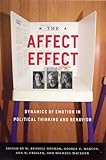The affect effect: dynamics of emotion in political thinking and behavior
Material type: TextPublication details: Chicago University of Chicago Press 2007Description: vi, 453 pISBN:
TextPublication details: Chicago University of Chicago Press 2007Description: vi, 453 pISBN: - 9780226574424
- 320.019 A3
| Item type | Current library | Collection | Call number | Status | Date due | Barcode | Item holds | |
|---|---|---|---|---|---|---|---|---|
 Book
Book
|
Ahmedabad | Non-fiction | 320.019 A3 (Browse shelf(Opens below)) | Available | 193474 |
Browsing Ahmedabad shelves, Collection: Non-fiction Close shelf browser (Hides shelf browser)

|

|

|

|

|

|

|
||
| 320.0151 O7P6 A political theory primer | 320.01513 R6M2 The mathematics of politics | 320.015192 P7 Probability models of collective decision making | 320.019 A3 The affect effect: dynamics of emotion in political thinking and behavior | 320.019 P6N2 Narcissism and politics: dreams of glory | 320.054 M8C2 Caste, class, and capital: the social and political origins of economic policy in India | 320.15 L2C6 The complexity of self government: politics from the bottom up |
Table of content.
1 Theorizing Affect’s Effects
W. Russell Neuman, George E. Marcus, Ann N. Crigler Michael Mackuen
Part I. Putting The Affect Effect In Perspective
2 Philosophical Psychology With Political Intent
Michael A. Neblo
3 Political Cognition As Social Cognition: Are We All Political Sophisticates?
Darren Schreiber
4 Emotional Processing And Political Judgment: Toward Integrating Political Psychology And Decision Neuroscience
Michael L. Spezio & Ralph Adolphs
Part Ii. Micro Models
5 The Primacy Of Affect In Political Evaluations
Dan Cassino & Milton Lodge
6 The Third Way: The Theory Of Affective Intelligence And American Democracy
Michael B. Mackuen, George E. Marcus, W. Russell Neuman & Luke Keele
7 Affective Intelligence And Voting: Information Processing And Learning In A Campaign
David P. Redlawsk, Andrew J. W. Civettini & Richard R. Lau
8 Identities, Interests, And Emotions: Symbolic Versus Material Wellsprings Of Fear, Anger, And Enthusiasm
Ted Brader & Nicholas A. Valentino
9 On The Distinct Political Effects Of Anxiety And Anger
Leonie Huddy, Stanley Feldman & Erin Cassese
10 Don't Give Up Hope: Emotions, Candidate Appraisals, And Votes
Marion R. Just, Ann N. Crigler & Todd L. Belt
Part Iii. Macro Models
11 The Road To Public Surveillance: Breeching Attention Thresholds
Doris Graber
12 Meaning, Cultural Symbols, And Campaign Strategies
David C. Leege & Kenneth D. Wald
13 Testing Some Implications Of Affective Intelligence Theory At The Aggregate Level
Peter F. Nardulli & James H. Kuklinski
Part Iv. Next Steps In Research And Outreach
14 Politics And The Equilibrium Of Fear: Can Strategies And Emotions Interact?
Arthur Lupia & Jesse O. Menning
15 The Affect Effect In The Very Real World Of Political Campaigns
Dan Schnur
16 Cognitive Neuroscience And Politics: Next Steps
Rose Mcdermott
References
Contributors
Index
Passion and emotion run deep in politics, but researchers have only recently begun to study how they influence our political thinking. Contending that the long-standing neglect of such feelings has left unfortunate gaps in our understanding of political behavior, The Affect Effect fills the void by providing a comprehensive overview of current research on emotion in politics and where it is likely to lead.
In sixteen seamlessly integrated essays, thirty top scholars approach this topic from a broad array of angles that address four major themes. The first section outlines the philosophical and neuroscientific foundations of emotion in politics, while the second focuses on how emotions function within and among individuals. The final two sections branch out to explore how politics work at the societal level and suggest the next steps in modeling, research, and political activity itself. Opening up new paths of inquiry in an exciting new field, this volume will appeal not only to scholars of American politics and political behavior, but also to anyone interested in political psychology and sociology.
http://press.uchicago.edu/ucp/books/book/chicago/A/bo5471683.html
There are no comments on this title.

